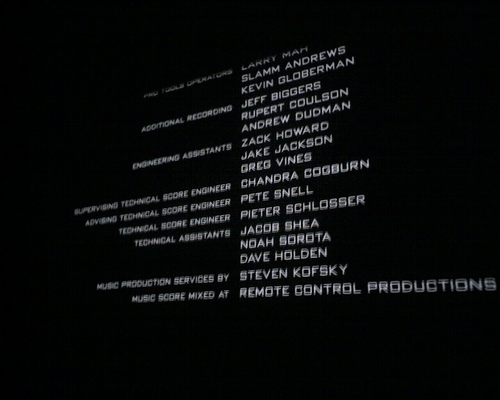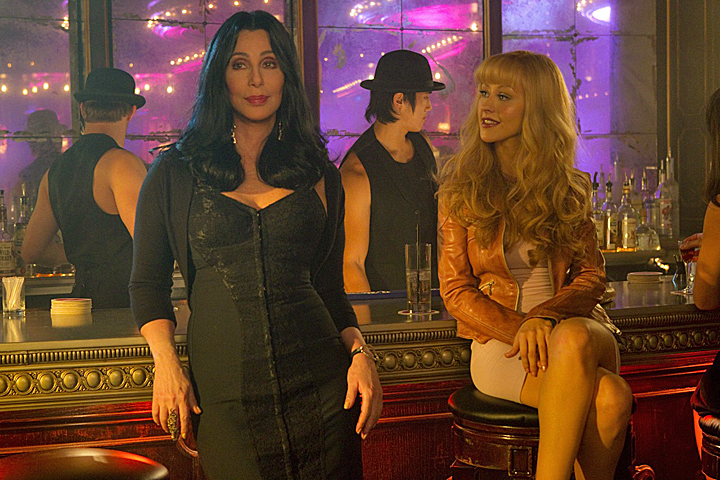Q. Having been a fan of the short-lived and vastly underrated animated series “The Critic,” the episode “Siskel & Ebert & Jay & Alice” never ceases to make me laugh. Having also been a fan of yours, I wondered three things: 1. How did getting you and Gene Siskel on the show occur? 2. Did you have any say-so in your lines? 3. Were you a fan of the show?
Jeremy Sollie, Meridian, MS
A. They asked us to do the voice-overs, and although we usually turned down opportunities to act, this was too good an opportunity to resist. The dialogue was written by the show creators, although we may have tweaked a few words. And, yes, we liked the show.
Q. What’s with how long films have become lately? Every review of “Funny People” mentions its length, and you’ve commented on many others recently (“Transformers 2” comes to mind). If I were a studio executive in these lean times, I’d demand most films come in around 90 minutes (unless your name was Scorsese, Eastwood, etc). I suppose some people will say it’s an attention-span thing, but unless there’s a good reason for a film going over two hours, I say put those editors to work!
Steve Roberts, Plantation, FL
A. Every film requires its own length. It isn’t too long unless it seems too long. And the cost of a film does not necessarily reflect its length.
Q. Where are all the summer movies? We have about 30 screens locally, and the only thing new that opened on a recent Friday was “Brüno.”
Teresa Ash, Rock Island
A. Many American moviegoers never get a chance to sample the range of new movies because the multiplexes are mass-booked with a handful of the same pictures.
Q. (Spoilers!) In the case of the movie “Moon,” starring Sam Rockwell, I have a thought about the plot. When Sam 1 (the first one we meet and who we assume is human or the original human) manages to make a phone call directly to his home, he discovers that 15 years have elapsed, not nearly three. However, what I notice and am pretty sure about is that the father in that home, who speaks in the background to ask his daughter who’s calling, is voiced by Sam Rockwell. I think Sam 1 as well as Sam 2, 3, 4, etc. are ALL clones.
I think the point might be that the original Sam spent his three years in space, during which time clones were made of him (whether he was unwittingly part of that or not, I have no idea). It is the clones who have been operating the business for the last 12 years. When Sam 2, at the very end, makes it back to Earth and is reported to have announced himself to Congress as a clone, nobody believes him! But I think that is the point. I’m basing this on the sound of the father’s voice, but I like the way it wraps up the plot. It explains, also, some of my confusion about what happens to Sam 1 and Sam 2 on the ship. In fact, every clone might be rigged to have an accident and die in the lunar module, for all we know.
Beth Solomon, Earth
A. Given the premise of the clones, your theory seems to solve some of the film’s apparent contradictions.
Q. Re your review of “Malls R Us“: Though I can understand how some may criticize malls as the bane of consumerism, there is another reason why people love them, too. I love going to them not for the shopping, but for the climate. In Asia and especially the Middle East, people can’t wait to get to the malls just to be comfortable and do something. You just won’t see a lot of Westerners going for outdoor sports or taking leisurely strolls in temperatures ranging from the mid-30s to upper 40s (Celsius) or 95 to 118 degrees (Fahrenheit).
Michael Mirasol, Manila, Philippines
A. The film has a love-hate relationship with malls, as do a lot of us.
Q. What is your opinion of film directors such as Clint Eastwood, Woody Allen, Steven Spielberg, Brian de Palma and John Landis, who refuse to provide audio commentaries on their DVDs, instead opting for their films to “speak for themselves”? Would someone such as yourself, who has, indeed, provided commentaries on various films, tend to agree that these directors are cheating fans and scholars by withholding their own personal insights?
Those directors who have, such as William Friedkin, Martin Scorsese, John Woo, John Boorman, Francis Ford Coppola, Billy Bob Thornton, George Miller and Oliver Stone, have aided our ability to enjoy their work on a higher, more detailed and enjoyable level. Speaking of Stone, he had so much to say regarding the making of his film “Nixon,” that he generously provides not one but two separate audio tracks, something that I have never seen (or perhaps, heard) on any other DVD.
Kevin Fellman, Phoenix, AZ
A. It’s their film and they can do what they like. I once tried to enlist Orson Welles in talking through “Citizen Kane,” and his response was, “I’m tired of talking about that film.”
Q.In your review of “The Ugly Truth,” your main argument is that there is, essentially, too much out-of-context “blue” material and that the film drags down the cast. Fair enough. But I’m confused about the line in your final paragraph: “Amazing that this raunchy screenplay was written by three women.” So what? Women are not allowed to write raunchy screenplays, when they are the gold standard for successful men’s comedies these days?
As formulaic and standard as “The Ugly Truth” was, I would have to say I embraced the curse words and innuendos, vs. the inane “Austin Powers”-like innuendo a PG-13 rating requires. No matter the rating, they still get their sex jokes in, one way or another.
Typically, these standard romcoms also force the female character to completely change her personality before she gets the man; while here, Abby realizes that she need not change anything. She’s still a control freak at the end, and Mike’s still a thug. Do you think this vulgarity for vulgarity’s sake drags all of these comedies down, or just that women writers and/or stars should be held to a higher standard? Kim Brown, writer, Tulsa World
A. Women screenwriters should certainly have all the latitude of men. It’s just that “The Ugly Truth” is so outspokenly vulgar it surprised me, and I don’t usually associate that sort of screenplay with women.
Q. When did studios get so coy about revealing the name of actors? For several recent movies, the house lights were on and half the audience had left before the actors’ names finally appeared on the screen. Greg Nelson, Chicago, IL
A. I know exactly what you mean. A movie opens with the animated credits of half a dozen producing companies, which are there for bragging rights, and then plunges directly into the action. After it’s over, we often get countless technical credits before it finally divulges the actors’ names. In the classic tradition, the actors were named right at the top, after the title.












